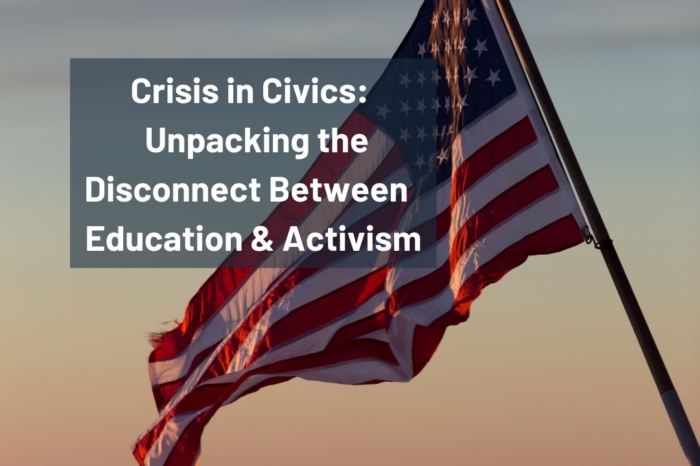The Disconnect Between Education and Activism
If you’ve found yourself confused by the vitriolic state of discourse in higher education in recent months, I might be able to provide some insight.
I study humanities at a well-known liberal arts college in the early 2020s. I am quite literally in the belly of the beast.
I’m sympathetic when I hear individuals lament cancel culture, radicalized student bodies, and anti-free speech climates in our institutions of higher learning. After all, it’s usually my cohort —today’s crazy students — whom they blame.
In many ways, it’s right to do so. Mine is among the most historically and civically illiterate generations in recent memory. Many of us “youths” lack awareness of our nation’s founding ethics and ideals that form what historian Wilfred McClay calls the “common treasure” of American cultural life.
But in our defense, I might suggest that our lack of aptitude is the result of increasingly substandard history and civics education. Recall the great Massachusetts senator and statesman Daniel Webster, who said, “If truth be not diffused, then error will be.”
While Webster was speaking about the need to diffuse religious teaching and literature throughout the nation, his words are equally applicable to other academic areas, notably that of civics and U.S. history.
The weakening of history and civics curricula, both in Massachusetts and across the nation, have undoubtedly contributed to the fraught climate found in so many colleges and universities today.
In chapter 6 of Pioneer’s new book, Restoring the City on a Hill: U.S. History and Civics in America’s Schools, we learn how the 2018 revisions to Massachusetts’ “History and Social Science Framework” curtailed academic standards and state assessments while minimizing the enduring legacy of our Constitution.
Rather than focus on improving student aptitude, the 2018 revisions sought to enhance student activism by launching a new “Civic Engagement Initiative.” That initiative amounted to a thinly veiled training manual for engaging in political protest.
The Civic Engagement Initiative de-emphasizes the historical narratives that show the positive progress that Western societies have made and America’s central role in promoting that progress.
Simply put, the initiative places less emphasis on our Constitution and other founding documents, thus asserting that they are less relevant for contemporary understandings of American government and politics.
The impact of such changes is already evident. In Massachusetts, young people’s faith in government has already waned since the curricular revision.
In the 2018 Harvard Institute of Politics Youth Poll, almost half the respondents said they trusted the U.S. Supreme Court. In 2023 — only five years later — only a third of respondents say they still trust our nation’s highest legal body.

With history and civics classes less likely than ever to emphasize our constitutional legacy, are we surprised that today’s students have diminished faith in the constitutionally prescribed institutions of government?
Those who may still doubt the effects of the injection of “action civics” into secondary and postsecondary educational curricula should look around at college campus activity in Massachusetts this year. It’s clear that students have taken their activism training to heart.
- In September, protesters accosted speakers and interrupted Harvard University’s opening convocation. The protesters have continued to stage aggressive, almost daily actions in Harvard Yard.
- In October, police arrested some 57 student protesters at the University of Massachusetts Amherst for trespassing in the school’s administration building.
- Recently, Brandeis University police arrested seven protesters on charges including assault and battery on a police officer.
Educators and policymakers may think their reforms teach mere participatory skills for civic engagement that will help students learn to communicate with government representatives.
What they ignore is the declining trust in American institutions and increasing violence and hostility at political protests. These changes are, at least in part, the direct consequences of revisions to history curricula such as took place in Massachusetts in 2018.
So, the next time you hear of hostilities and violence at college protests and think “Don’t these kids know any better?” you’d be right — they don’t know any better.
Many on today’s college campuses have yet to learn that time-honored constitutional protections for “petitioning the government for redress of grievances” don’t give legal carte blanche to actions such as trespassing and assault.
Given the state of their civics books and curricula, it’s easy to understand why.
Jude Iredell is a Roger Perry Civics Intern with the Pioneer Institute. He is a senior at Pomona College in Claremont, California and is pursuing a degree in history.



